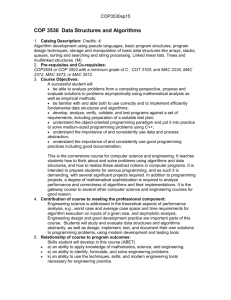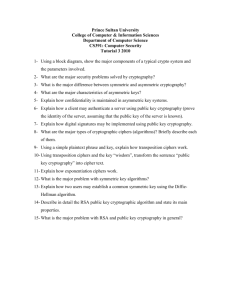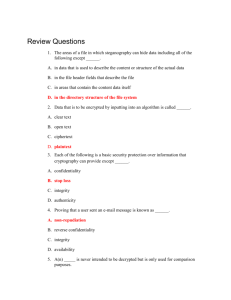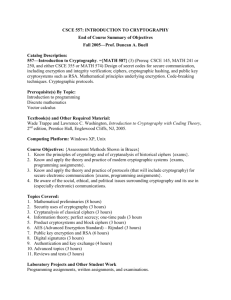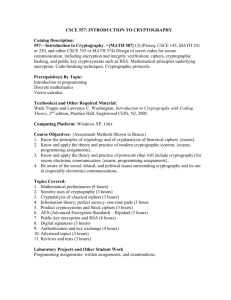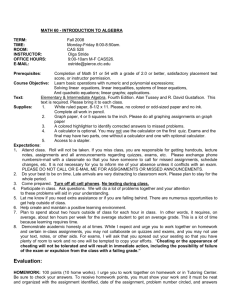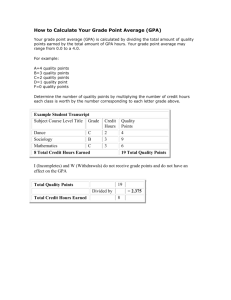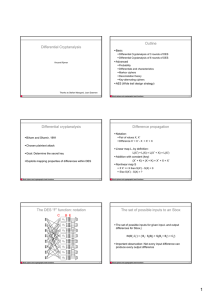Syllabus - Department of Computer and Information Science and
advertisement
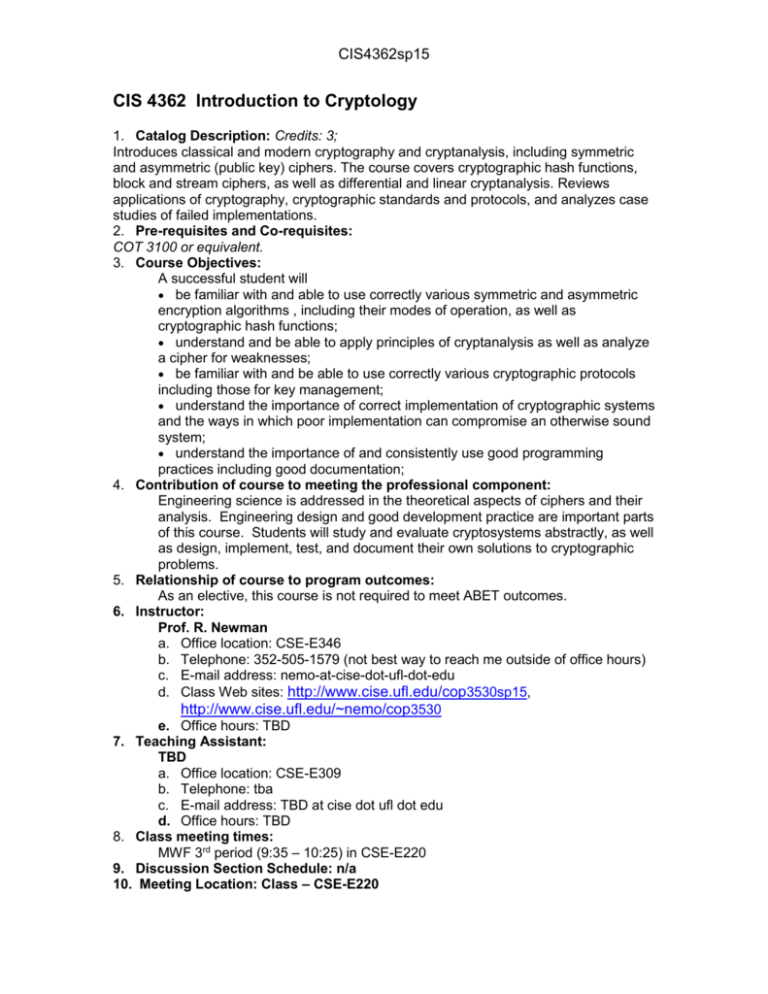
CIS4362sp15 CIS 4362 Introduction to Cryptology 1. Catalog Description: Credits: 3; Introduces classical and modern cryptography and cryptanalysis, including symmetric and asymmetric (public key) ciphers. The course covers cryptographic hash functions, block and stream ciphers, as well as differential and linear cryptanalysis. Reviews applications of cryptography, cryptographic standards and protocols, and analyzes case studies of failed implementations. 2. Pre-requisites and Co-requisites: COT 3100 or equivalent. 3. Course Objectives: A successful student will be familiar with and able to use correctly various symmetric and asymmetric encryption algorithms , including their modes of operation, as well as cryptographic hash functions; understand and be able to apply principles of cryptanalysis as well as analyze a cipher for weaknesses; be familiar with and be able to use correctly various cryptographic protocols including those for key management; understand the importance of correct implementation of cryptographic systems and the ways in which poor implementation can compromise an otherwise sound system; understand the importance of and consistently use good programming practices including good documentation; 4. Contribution of course to meeting the professional component: Engineering science is addressed in the theoretical aspects of ciphers and their analysis. Engineering design and good development practice are important parts of this course. Students will study and evaluate cryptosystems abstractly, as well as design, implement, test, and document their own solutions to cryptographic problems. 5. Relationship of course to program outcomes: As an elective, this course is not required to meet ABET outcomes. 6. Instructor: Prof. R. Newman a. Office location: CSE-E346 b. Telephone: 352-505-1579 (not best way to reach me outside of office hours) c. E-mail address: nemo-at-cise-dot-ufl-dot-edu d. Class Web sites: http://www.cise.ufl.edu/cop3530sp15, http://www.cise.ufl.edu/~nemo/cop3530 e. Office hours: TBD 7. Teaching Assistant: TBD a. Office location: CSE-E309 b. Telephone: tba c. E-mail address: TBD at cise dot ufl dot edu d. Office hours: TBD 8. Class meeting times: MWF 3rd period (9:35 – 10:25) in CSE-E220 9. Discussion Section Schedule: n/a 10. Meeting Location: Class – CSE-E220 CIS4362sp15 11. Material and Supply Fees: n/a 12. Textbooks and Software Required a. Title: CRYPTOGRAPHY AND NETWORK SECURITY b. Author: STALLINGS c. Edition: PRENTICE HALL 5th 2011 or 6th 2014 d. ISBN: 0136097049 or 0133354695/9780133354690 13. Recommended Reading: a. Title: CRYPTOGRAPHY AND NETWORK SECURITY b. Author: Kaufman, Perlman & Speciner c. Publisher, date: PRENTICE HALL 1995 d. ISBN 0-13-061466-1 14. Course Outline (topics covered by week, approximately) a. Introduction (1 wk) b. Symmetric Ciphers (5 weeks) i. Classical Ciphers ii. DES iii. Finite Fields and Number Theory iv. AES v. Block Cipher Modes vi. PRNGs and Stream Ciphers Exam 1 c. Asymmetric Ciphers (3 weeks) i. Number Theory ii. RSA iii. Diffie-Hellman iv. El Gamal v. ECC d. Data Integrity and Cryptographic Hash Functions (3 weeks) i. Cryptographic Hash Functions ii. MACs iii. Digital Signatures Exam 2 e. Trust: Key Management and User Authentication (2 weeks) i. Key Management and Distribution ii. PKI iii. User Authentication f. Network Security and Protocols (3 weeks) i. Network Access Control and Cloud Security ii. TLS iii. Wireless Security iv. Email Security v. IPSec Exam 3 Term Projects 15. Attendance and Expectations: Attendance is required. Pop quizzes may be given on assigned reading and on material covered in classes. Cell phones and pagers must be silent during class. Reading emails, facebook, etc. is appropriate at some other time and place. CIS4362sp15 Do bring your laptop with you to respond to on-line questions and to work out programming problems in discussion. Questions are encouraged - raise your hand to be recognized. Try to formulate the question before asking it, and wait to see if it is answered in a few minutes so we can maintain flow. Lengthy discussions will be deferred to office hours. Students are required to check the class web pages at least three times a week (MWF) for announcements/updates. You are responsible for all assignments posted on the web page or announced in class. Projects are all to be done on an individual basis. 16. Grading – methods of evaluation: a. Quizzes and Homeworks: 20% b. Exams: 50% c. Projects: 30% Project grades include scoring for documentation and good programming practice in addition to efficiency and correct functionality. Refer to the undergraduate software grading rubric for more information. 17. Grading Scale: Grades are curved. However, there some guidelines you may follow: a. A = 80% on exams, 90% on projects, 90% on homeworks and quizzes b. B = 70% on exams, 80% on projects, 80% on homeworks and quizzes c. C = 60% on exams, 70% on projects, 70% on homeworks and quizzes Significantly better performance in one method may make up for poorer performance in another method up to a point, but you cannot pass unless you have earned at least 60% on your projects. Obligatory Statements “A C- will not be a qualifying grade for critical tracking courses. In order to graduate, students must have an overall GPA and an upper-division GPA of 2.0 or better (C or better). Note: a C- average is equivalent to a GPA of 1.67, and therefore, it does not satisfy this graduation requirement. For more information on grades and grading policies, please visit: https://catalog.ufl.edu/ugrad/current/regulations/info/grades.aspx “Undergraduate students, in order to graduate, must have an overall GPA and an upper-division GPA of 2.0 or better (C or better). Note: a C- average is equivalent to a GPA of 1.67, and therefore, it does not satisfy this graduation requirement. Graduate students, in order to graduate, must have an overall GPA of 3.0 or better (B or better). Note: a B- average is equivalent to a GPA of 2.67, and therefore, it does not satisfy this graduation requirement. For more information on grades and grading policies, please visit: https://catalog.ufl.edu/ugrad/current/regulations/info/grades.aspx 18. Make-up Exam Policy Exams must be taken at the scheduled time, except under extreme extenuating circumstances. Written documentation of circumstances (e.g., doctor’s note on letterhead, obituary notice, etc.) must be submitted with the request for a make-up examination. No exams will be given early, and discretionary travel does not qualify as an extenuating circumstance. 19. Honesty Policy All students admitted to the University of Florida have signed a statement of academic honesty committing themselves to be honest in all academic work and understanding that failure to comply with this commitment will result in disciplinary action. This CIS4362sp15 statement is a reminder to uphold your obligation as a UF student and to be honest in all work submitted and exams taken in this course and all others. 20. Accommodation for Students with Disabilities Students Requesting classroom accommodation must first register with the Dean of Students Office. That office will provide the student with documentation that he/she must provide to the course instructor when requesting accommodation. 21. UF Counseling Services Resources are available on-campus for students having personal problems or lacking clear career and academic goals. The resources include: UF Counseling & Wellness Center, 3190 Radio Rd, 392-1575, psychological and psychiatric services. Career Resource Center, Reitz Union, 392-1601, career and job search services. 22. Software Use All faculty, staff and student of the University are required and expected to obey the laws and legal agreements governing software use. Failure to do so can lead to monetary damages and/or criminal penalties for the individual violator. Because such violations are also against University policies and rules, disciplinary action will be taken as appropriate. We, the members of the University of Florida community, pledge to uphold ourselves and our peers to the highest standards of honesty and integrity.
